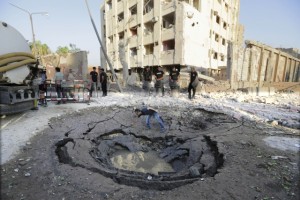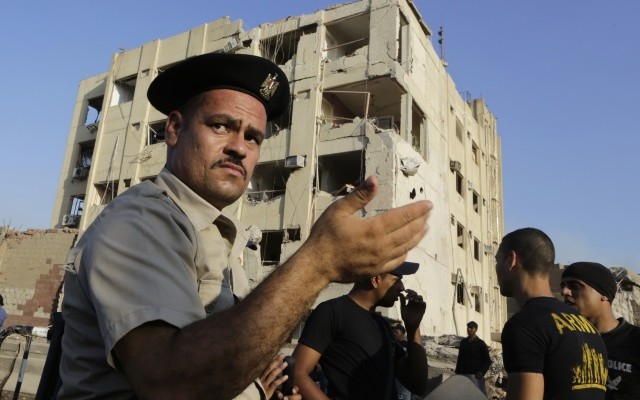ISIS claimed responsibility for a massive car bomb attack that wounded 27 in the Egyptian capital.
By: AP and World Israel News Staff

A crater caused by the explosion. (AP/Amr Nabil)
A massive car bomb exploded early Thursday near a national security building in a popular residential neighborhood in Cairo, wounding 27, including seven police officers, and blowing the facades off nearby buildings, Egyptian security officials said.
There were no reports of deaths from the explosion, which demolished a wall in front of the government building and smashed its structure, leaving gaping holes exposing its offices. Glass from blown-out windows littered the surrounding streets in the popular Shubra el-Kheima neighborhood.
Ambulances and fire trucks rushed to the scene, which was flooded with water from pipes broken by what authorities said was a blast from high explosives. The explosion could be heard and felt across the city.
Emergency aid head Ahmed al-Ansari said the wounded were evacuated to nearby hospitals. Wrecked cars stood around the building as security forces patrolled the streets and set up roadblocks to ward off hysterical residents.
The Islamic State (ISIS) terror organization’s affiliate in the Sinai claimed responsibility for the attack
Explosion Was ‘Like an Earthquake’
This latest attack is the last in a surge of assaults on security forces since the 2013 military overthrow of Islamist president Mohammed Morsi. Previous large-scale attacks have also been claimed by an ISIS affiliate based in the northern Sinai Peninsula.

Egyptian President Abdel-Fattah al-Sissi. (Egyptian Presidency/Mohammed Abdel-Muati via AP)
Inside his ruined clinic next door to the security building, plastic surgeon Gawad Mahoud lamented Egypt’s troubles since the military ousted Morsi, the country’s first freely elected president, amid massive protests against his divisive yearlong rule.
“We were here painting the office, and then it went off. It was like an earthquake, it blew the doors off and smashed all the windows in,” he said. “The explosion sounded professional, it wasn’t small-time.”
Access to the area was highly restricted with dozens of policemen, plainclothes and uniformed, discouraging any approach. At the site, press credentials of the few foreign journalists who managed to arrive were checked repeatedly by authorities.
Egypt has been wracked by a wave of attacks since President Abdel-Fattah al-Sisi overthrew Morsi and launched a heavy crackdown against his supporters and dissent in general.
Last weekend, he decreed a new anti-terrorism law presented amid a wave of attacks and killings this summer. The far-reaching new law sets a sweeping definition regarding who could face a harsh set of punishments. Journalists could be fined for reporting that contradicts Defense Ministry statements.
Egypt has lacked a legislature for three years, and since being elected a little over a year ago, al-Sisi has single-handedly passed dozens of laws.
The Cabinet approved the draft anti-terrorism law last month, two days after a car bomb in an upscale Cairo neighborhood killed the country’s prosecutor general, Hisham Barakat.
On the day it was approved by ministers, Islamic terrorists launched a multi-pronged attack attempting to seize a northern Sinai town, hitting the military with suicide attacks and battling soldiers for hours.
The violence has largely been confined to the restive northern part of the Sinai Peninsula, but Cairo and other parts of the mainland have been rocked by a series of mostly small-scale explosions targeting police.
A truck bomb in January 2014 targeting Cairo’s security headquarters killed four people and damaged a nearby museum dedicated to Islamic arts and history.
A month earlier, a car bomb tore through a security headquarters in the Nile Delta city of Mansoura, killing 16 people, nearly all policemen. Ansar Beit al-Maqdis, as the Sinai outfit was known before it pledged allegiance to the ISIS group last year, claimed responsibility.





